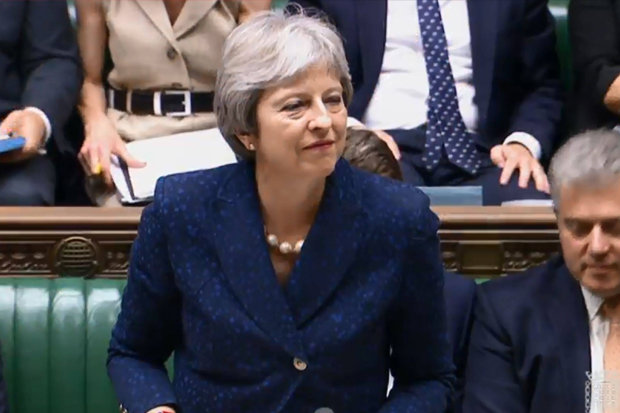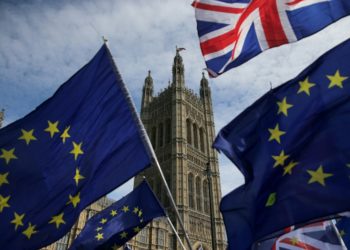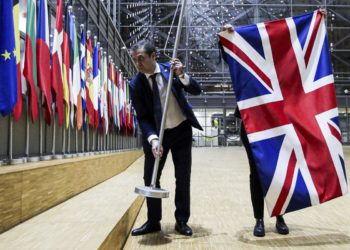Cans are flying off shelves as people in the U.K. are taking to stockpiling food in case import of processed goods from Europe is stopped when the U.K. leaves the E.U. in March 2019. Likewise, the European Union itself has told its member countries to prepare for a no-deal Brexit including plans for long lines at seaports, new rules for everything from medicine to cattle and changes in airport rules. In addition, stock market arrows are fluctuating up and down each day with the uncertainty of the pound/Euro exchange rate.
Upset Europeans and U.K. citizens are worried as Brexit negotiations with the E.U. have yet to be reached. The deadline to reach a deal is aimed at October 18-19 at the E.U. Summit. The negotiations are in their last, and most difficult 20 percent of rounds with E.U. states. Leaders ranging from Tony Blair to Sadiq Khan are calling for a referendum as the only way out.
British citizens voted in June 2016 to have the U.K. leave the E.U. and declare its own sovereignty over a variety of issues, especially trade and immigration. Negotiations have stalled and it is looking extremely unlikely that a “hard Brexit,” the original concept of British sovereignty over all its dealings with Europe, will happen, and that a partnership curtailing towards the E.U.’s guidelines will be what accomplishes the goal of the U.K. exiting the union in March 2019 with some sort of deal. Either way, now most British citizens are disillusioned with parliament and think Brexit was a mistake.
Soft Brexit
This Soft Brexit attempt has upset original Brexit ideologists at Prime Minister Theresa May as she worked out a compromise in an attempt to please her party and constituents while keeping trade open with Europe. May is now the leader of an “incomplete half-in half-out…mush” plan, according to former Prime Minister Blair.
Some Conservative members of the British parliament are seeking to unify the rest of their colleagues behind May’s softer Brexit plan than originally proposed in order to reach a deal with the E.U. by the fast-approaching October deadline. This plan would allow for reparations and tariffs beneficial to the E.U. and to Northern Ireland, which wishes to remain in the E.U. while continuing trade with the U.K. to its geological south. This move upset top cabinet officials, with now-resigned foreign secretary Boris Johnson quoted as saying, “The Brexit Dream is Dying.”
EU final criteria
While May and others are working out their plans, the E.U. is standing firm on its principles.
In Washington, Michel Barnier, Chief Negotiator in charge of representing the E.U. in talks with the U.K., did not waver in his stance on the solidarity of the European Union. “There is no justification to unravel what we are because the U.K. is leaving.” He offered up a plan to compromise on some matters but left key issues out as reasons for the E.U. not to make a deal.
He defended the E.U.’s guidelines to Brexit negotiations, which would allow for a free trade agreement, socio-economic cooperation, police, and judicial cooperation in criminal matters and foreign defense policy on a “third country status.” This would make the U.K. a third partner country to agreements for countries inside the E.U. The U.K would essentially be a third wheel, and far less important, to overall European affairs. Barnier emphasized that their guidelines would be on the movement of people, goods, services, and capital, but not physical borders.
Barnier pointed to the complexity of E.U. and said the bloc is composed of 27 separate states, and not joined under a federal state. He upheld some of the E.U.’s toughest guidelines while saying that the treaty they have proposed to the U.K. has room for flexibility built in it as a tool of negotiation agreements. He also emphasized that the E.U. is not one “supernation” against the U.K., but 27 states and people united under an umbrella of a single market trying to compromise with what will be a third state in their trade policies. Britain makes up about a sixth of the European Union’s economy, which is why the E.U. is working so hard to strike a deal with them in an attempt at a concept of a more flexible Europe.
Complications of N. Ireland, Defense and Partnerships
Overall, the E.U. idea of a flexible Europe is a complicated one. The most difficult struggles of the U.K./E.U. deal are Northern Ireland borders, a plan of defense for the continent, regulatory immigration policies and partnership with other nations.
The most controversial of the E.U. guidelines at the moment is the Backstop Proposal concerning Ireland and Northern Ireland. The backstop would ensure checks and rules for goods entering into Northern Ireland ports while keeping the border open between Northern Ireland and the rest of the U.K. With this in place, Northern Ireland would remain under the E.U. while still honoring the 1998 Good Friday Agreement to keep physical borders open between it and Ireland, which is part of the U.K. and Brexit. This is a red-line issue in the E.U.’s, as well as Ireland’s opinion.
Barnier stated that a deal with the U.K. would not be reached without this important measure. “I’m not speaking of borders, I’m speaking of a single market.” He emphasized the importance of this issue of helping Northern Ireland stay open. “We have to be careful. We agreed to protect this agreement, and that means no borders.” He mentioned to the press how successful controls were already in place for goods coming into the Belfast airport without borders.
While the U.K. has always been a stronghold of European defense, that is looking to change. In a statement on defense, Barnier said that “for the first time” the E.U. would be investing in a defense fund, called the European Defense Fund. He said the E.U. would be raising funds and seek NATO’s cooperation to establish a defense fund for the 27 states of the bloc. Some states, such as Switzerland and Finland, maintain neutrality and are not part of NATO. Barnier struggled to state how these members of the E.U. would be part of the European Defense Fund while also maintaining no part in it financially.
In addition to managing neutral nations within the E.U., he stated a few more stances on the European Defense Fund and partnerships. Barnier said the E.U. would consider including the United States as a third party contributor of help in the EDF and were looking to discuss doing so in the near future. He did not clarify how the U.S. would help or be involved, other than on an advisory basis. He also maintained that the EDF would defend the Iran Nuclear Deal and its partnerships within that deal.
No Brexit Implications
Speaking on the members of U.K. parliament coming together to reach a deal, Professor Gavin Barrett of University College Dublin summed up the situation as difficult for the British and one needing some handing over of reins to the E.U., likely in a special status form not seen before in modern Europe.
He warned of the implications of a Brexit without a deal with the EU. The U.K., in his opinion, would be a literal and figurative island in the global market. He told The Globe Post that there are real implications in the likely case that they do not make a deal. “Thousands of jobs could be lost and the country could enter into a recession. The safety and security of the many lives of the U.K. depend on them reaching some sort of compromise.”
May’s hard-won Soft Brexit policy is looking to be defeated by a joint Torie-Labour amendment made on July 17 for a customs union, in an attempt to destroy Brexit entirely and topple her Conservative government. This has thrown the market into disarray.
Overall, opinion varies each week and has led to a highly confused mess of plans for British citizens. The idea of a new referendum is controversial at this stage. Many British citizens are hoping for some sort of compromise with the E.U. Others want a no-deal over a bad deal with the E.U.
Overall, most Brits have lost all trust in the government to carry out either their original Brexit vote or any sort of contingency plan, and are planning to prepare themselves and their families for a no-deal Brexit in 2019.



















